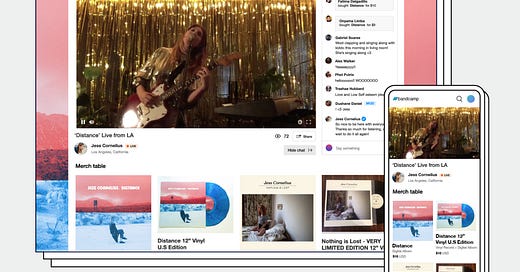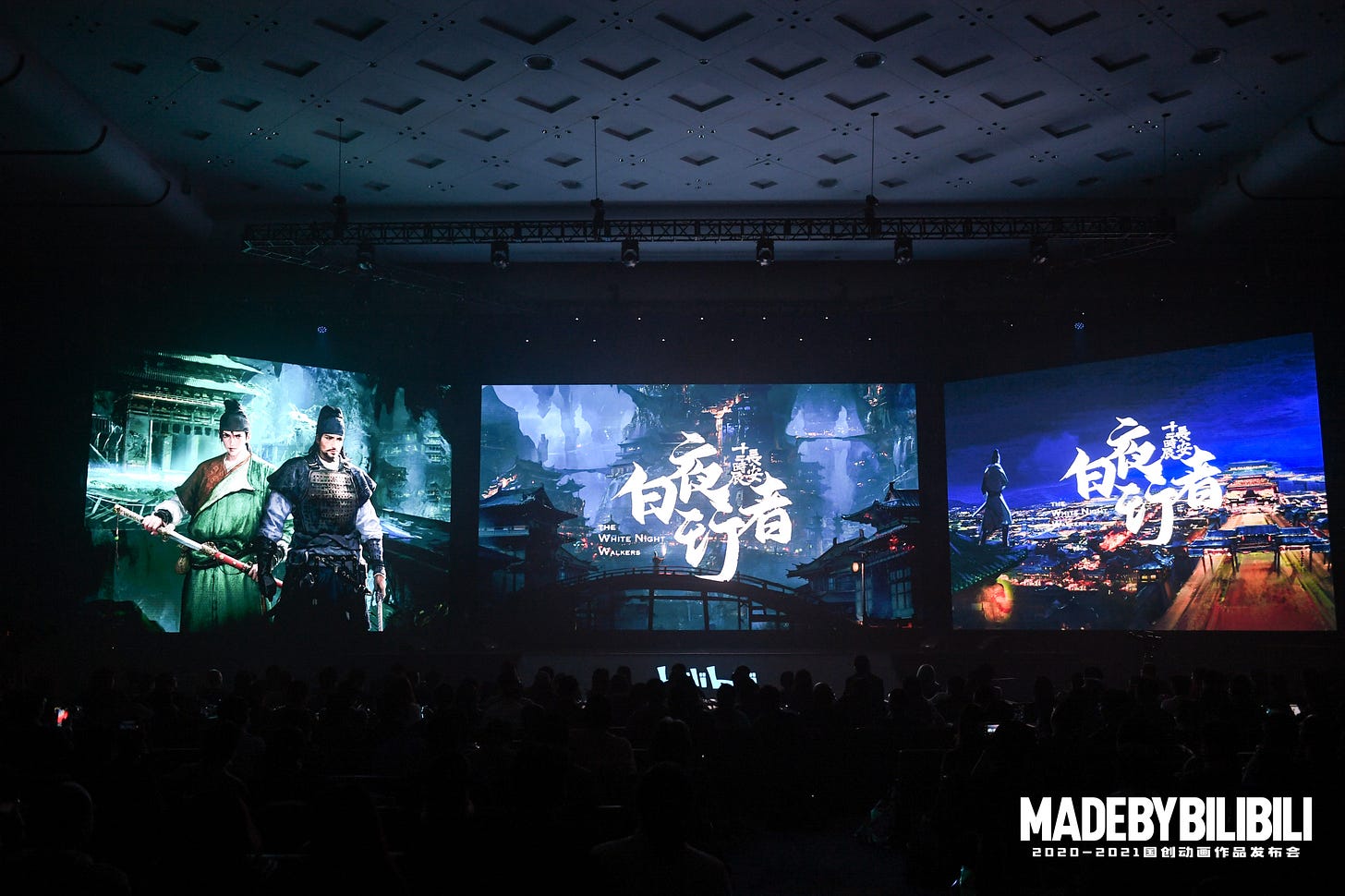Global View: For Performers, Livestreaming Is Here to Stay
Plus: Food + brand collaborations get a little less cheesy, BMW taps 90s nostalgia, and the U.K. hands Europe a post-holidays gift.
The Content Commerce Insider newsletter highlights how brands create content to drive revenue. If you have received our newsletter from a friend or colleague, we hope you will subscribe as well and follow us on LinkedIn and Instagram.
Based on reader requests for more global coverage, Content Commerce Insider is set to debut our global edition newsletter on Friday, December 4, joining our twice-weekly China edition. The following is a preview of the content that will be included in our new global edition. Have an idea for coverage you’d like to see? Reach out and let us know.
As the coronavirus spread in China earlier this year and hundreds of millions of citizens were confined to their homes, the phrase “cloud living” entered the national lexicon. Describing the trend for all kinds of content to move online — from daytime TV shows to fitness classes, often streaming from the living rooms of their hosts — cloud living took on a new sense of urgency as housebound viewers tuned in to livestreamed cooking classes, fashion shows, and makeup tutorials by influencers.
This was particularly noticeable in the music industry, which saw concerts and DJ sets quickly move online after mass gatherings were shut down. The Beijing-based indie label Modern Sky kicked off the trend with its “Stay at Home Strawberry” music festival on video platform Bilibili in early February, and events on other platforms soon followed, supported by sponsors such as Kind Bars and Sonos.
Brands also shifted to producing events for the “cloud” and, even as China reopened, adopted hybrid online and offline approaches, as seen in Spanish luxury brand Loewe’s livestreamed Paula’s Ibiza event, which featured performances by Chinese rappers Tizzy T and Li Daben.
But where livestreaming performances are becoming arguably the most interesting and showing the clearest potential is in the global independent music scene, where artists who depend heavily on touring for their income are struggling to survive a year virtually devoid of live shows. Following in the footsteps of Chinese platforms that have long offered performers ways to monetize their livestreams, online music company Bandcamp recently introduced Bandcamp Live, a platform for artists to set up livestreamed ticketed performances.
According to Pitchfork, Bandcamp’s online concerts can include virtual “merch tables,” real-time chats, and opportunities for promotion to existing Bandcamp users. As much as 85% of ticket sales will go directly to the artists, and the company will waive ticket fees for consumers through March 31, 2021.
Although the Covid-19 pandemic has largely been brought under control in China, with offline events back in play, livestreamed performances look set to stay both there and globally. Audiences have become accustomed to living more of their lives online, and even when live events eventually return to Europe and North America, a significant number of people may simply prefer to pay for a digital ticket to tune in to a show from the comfort of their own homes.
That is certainly the case in China, where paid livestreaming is not just a lifeline for musicians, but other performers such as stand-up comedians in the country’s fledgling comedy scene. Lacking an established bar-and-club scene like that of the U.S., comedians are increasingly reliant on livestreaming and tips from at-home audiences (as well as the occasional opportunities to work with brands or appear on reality shows) to make ends meet. If the trend continues as it has for music, it is likely that we will see very similar approaches taken by stand-up performers in overseas markets as well.
- by Avery Booker
Mentioned in today’s newsletter: Adidas, Bandcamp, Bilibili, BMW, Bytedance, Crocs, Douyin, Hermès, Hey Tea, KFC, Kind Bars, Mengniu, Modern Sky, Loewe, Olay, Qiyu Culture, Sonos, Xigua Video.
Short Video Platforms and Custom Content Offer New Opportunities for Brands
by Ginger Ooi
With a generally higher tolerance for sponsored content from Chinese audiences, brands have an increasing number of opportunities to be featured in novel ways on both scripted and unscripted programming across a variety of platforms and innovative formats. Below are a few of the latest creative brand integrations recently seen on Chinese video and TV:
We’ve previously noted Kuaishou’s moves into more original content as it vies to compete with rival Douyin and other rising platforms such as Bytedance’s Xigua Video and Bilibili. New formats being developed for the short video platform also offer opportunities for brands.
Recently, Chinese dairy giant Mengniu’s Zhen Xiang was integrated as the title sponsor for Kuaishou’s short drama series “Today’s Menu — I Really Want To Get Together” (今日菜单之—真想在一起), a lighthearted romance about a couple named Chen Zhen and Li Xiang (whose given names combine into the brand name Zhen Xiang).
Mengniu’s involvement also featured multiple insertions that riffed on the characters’ day-to-day lives, along with product placement and consumption throughout the series, and graphic elements promoting the brand. Mengniu also kept audiences engaged via a Weibo campaign that offered gift boxes to lucky fans as they watched the recent season finale.
Meanwhile, Bytedance partnered with production house Qiyu Culture to produce a brand-sponsored documentary series called “Nice to Meet You” (很高兴认识你) to air on Douyin and Xigua Video. The show focuses on the real-life stories and the anxieties of modern life, offering travel as a means of self-healing and fulfillment. The program combines a “livestreaming + short video + reality show” format to heighten user engagement with hosts ZhouXun and Aya. Skincare brand Olay signed on as title sponsor, and guests on the show are seen using its products as they go about their daily lives.
Recruiting app Boss Zhipin has gone for brand integration on a bigger scale with its sponsorship of Beijing Satellite TV’s workplace reality series “Workplace Technicalities” (职场是个技术活). The competition-style series follows a group of interns at Boss’s offices as they learn to navigate the environment, with regular assessments and elimination challenges. The top-ranked interns will get to have an interview with company executives to vie for a job offer.
Boss CEO Zhao Peng makes regular appearances to offer feedback on the interns’ work as well as providing more general insights and wisdom on human resource matters. Boss also used the opportunity to also launch a series of products that fit into the show’s workplace theme, such as smartphone cases, business card holders, and even a mahjong set. It’s part of a broader effort by Boss to boost its brand recognition via entertainment — other initiatives have included collaborations with the hot folk-rock band Wu Tiao Ren, and the announcement of Hollywood star Gal Gadot as brand ambassador.
Still Gimmicky in the U.S., F&B + Brand Collaborations Gain Acceptance in China
by Avery Booker
One of the content-commerce segments that is starting to seep internationally is food and beverage (F&B) and brand collaborations, which we’ve seen in China in a wide array of formats—from a limited-edition bubble-tea themed Adidas x Hey Tea sneaker to a chicken takeaway bucket-themed Karl Lagerfeld x KFC purse and a set of National Gallery x Ramen Talk gift boxes.
In China, F&B and brand collaborations tend to go a step beyond the obvious or completely random and are often fairly well thought-out. For example, Adidas and Hey Tea may have nothing to do with one another at first glance, but when you consider how popular Hey Tea’s “Succulent Grape” beverage is in China, its trademark purple hue starts to make sense as a base for a sneaker colorway.
The concept has started to catch on in Western countries, particularly in the fast-food and snack sectors, led by—once again—KFC, by way of collaborations like the KFC x Crocs slip-ons it debuted at the beginning of the year. But other brands, too, have sought to attract online buzz via gimmicky collaborations, from a $20,000 Cheetos-themed ring and earring set in 2016 to a more recent line of clothing and accessories created by American stuffing brand Stove Top just in time for Thanksgiving.
Read the full article on Content Commerce Insider
Brand Film Pick: BMW Retells a Contemporary Chinese Journey to the West
This past spring and summer, the Chinese internet was captivated by the story of a single dad who rode a bicycle more than 2,500 miles across the country to Tibet with his 4-year-old daughter in tow. Sharing the experience on Douyin, the man amassed more than 2 million followers who celebrated the journey, which tapped into pent-up desires for the freedom of the road and the closeness of loved ones following an especially trying start to the year.
Inspired by the father-daughter journey, BMW adapted this story for its recent short film, “Summer in the Wild” (野俩的夏天), setting it in the 1990s and swapping out the bicycle for a battered motorcycle. The fifteen-minute film taps into nostalgia by adopting the daughter’s perspective, showing the newness of experience and personal growth that accompanies the physical journey, and creating an opportunity for BMW to highlight its newer models in the present, as the now-grown child retraces that long-ago summer in style.
End of British Tax Refund Program Hands Europe a Content-Commerce Opportunity in China
Already hurting from the absence of big-spending Chinese tourists, British luxury boutiques and retailers are poised to see another hit to the bottom line in 2021, when the United Kingdom formally ends its VAT Retail Export Scheme. The program, which refunds a significant portion of the 20% value-added tax on purchases made in the country by foreign travelers, was widely used by Chinese tourist-shoppers making big-ticket purchases over the past decade.
Although they make up only 5% of non-E.U. travelers in the United Kingdom, Chinese tourists tip the scales in terms of high-end spending, accounting for nearly a third of VAT refunds. For luxury retailers, the concern for 2021 and beyond is that, even if Chinese tourists are able to resume international travel, they may eschew luxury shopping in London for Paris, Madrid, or somewhere else (including, as we’ve seen this year, at home in China).
While some British brands and department stores are likely to say that the loss of the refund program won’t hurt their business — believing that tourists will still seek out the “experience” of in-in person shopping from quintessentially British brands — this move will be a massive post-holiday “gift” for brands and retailers elsewhere in the European Union.
Read the full article on Content Commerce Insider
News From China
As youth-oriented video platform Bilibili continues to upgrade its content offerings, it is looking to stand out with movies and a series of anime adaptations that will remake hit IP in a medium favored by China’s Gen Z, and one that is quickly going mainstream — the number of consumers for content related to ACG (Anime, Comics and Games) is expected to surpass 400 million this year.
At the recent “Made by Bilibili 2020-2021” event, the streamer announced a slate of 33 new anime projects for 2021, including 16 original series, four feature films for theatrical release, and several animated adaptations, with the popular action-comedy movie franchise “Detective Chinatown and the historical suspense novel “Longest Day in Chang’an” among them. (The latter was adapted into a drama series by Youku in 2019 to rave reviews).
E-commerce livestreaming is facing increased scrutiny in the aftermath of the record-breaking sales numbers posted for this year’s Singles’ Day, with several top livestreamers called out by the China Consumers’ Association in its recent report on the big event.
“Lipstick King” Li Jiaqi was censured for a poor after-sales service policy that reportedly restricted returns and exchanges, an apparent violation of China’s E-commerce Law, which mandates a minimum seven-day return period for online sales (his team responded that the brand in question had sold out of products and offered refunds instead of exchanges).
Meanwhile, comedian Li Xueqin and celebrity agent Yang Tianzhen were cited for fake traffic with a reported audience of 3.1 million, when actual viewership was around 110,000.
Veteran actress Liu Tao has been one of the most successful celebrities to transition to e-commerce livestreaming, making her mark as a top seller for Alibaba’s Juhuasuan flash sales platform, with a distinct persona known as “Liu Yidao” created for her role as a livestreamer, creating new opportunities to develop related IP such as animation and brand collaborations.
For Singles’ Day, the Liu Yidao character was cleverly upgraded into “Liu Yiyiyiyidao”: Yi means one in Chinese, and the four ones correspond to the November 11 date of the big shopping extravaganza.
Liu’s new spin on the “buy one, get one” promotion created buzz on social media, such as “buy apples, get a free iPhone” and “buy napkins, get a free Hermès scarf,” along with chances to win one of 11 beachfront properties, bringing more than 100 million views to her livestreams. Fans are already waiting for her next digital “shoppertainment” innovations for the Lunar New Year, which falls in mid-February next year.
News in English
Tencent Music Entertainment has taken a stake in the L.A.-based Wave, a virtual entertainment company that creates avatars of pop stars, with plans to bring its cutting edge technology to music fans in China via Tencent platforms. Deadline
Short-seller Muddy Waters released a damning report alleging that the Nasdaq-listed livestreaming firm Joyy’s business “is almost entirely fraudulent,” which the company refuted. CNN Business
The Muddy Waters report could be bad news for Baidu, which just agreed to buy Joyy’s Chinese livestreaming platform YY for $3.6 billion. Bloomberg
Chinese innovation in content-commerce and other areas of technology is fueling envy and a sense of having to catch up from American firms. New York Times
China, e-commerce, and Gen Z will be the drivers of luxury’s growth over the next decade, transforming the industry in the process, according to a new report from Bain & Company with Fondazione Altagamma. WWD
Viya, China’s top e-commerce livestream host, sold an astounding $890 million worth of products between July and September this year, followed by “lipstick King” Li Jiaqi with $530 million in sales over the same period. China Daily
The future of Singles’ Day in China will be less about record-breaking sales and more about fun and entertainment with appeal for younger consumers, according to Genki Forest COO Zhang Shaoyang. Coresight Research
Singles’ Day may also have a future outside of China, and not just among overseas Chinese shoppers, although the November 11 date poses some challenges for the United Kingdom and United States markets, where it is marked as Remembrance Day and Veterans’ Day, respectively. The Drum
Chinese Q&A platform Zhihu is often compared to Quora, but offer far more opportunities for brands to use the platform to reach its 420 million registered users. Nanjing Marketing Group
C-beauty brand Proya created a hit product with its “bubble mask” thanks to influencer marketing and Douyin. Parklu
China’s newest internet star is a 20-year-old Tibetan man who has drawn millions of fans, a local tourism endorsement deal, and invitations to join in livestreaming events. Sixth Tone
We’ve Got China Covered
China Film Insider: Chinese Fans Call for an Earlier Theatrical Release of “Wonder Woman 1984” in China
Jing Daily: The Six Big China Luxury Trends of 2020
Jing Culture & Commerce: Livestream Tips From Europe’s Cultural Influencers









